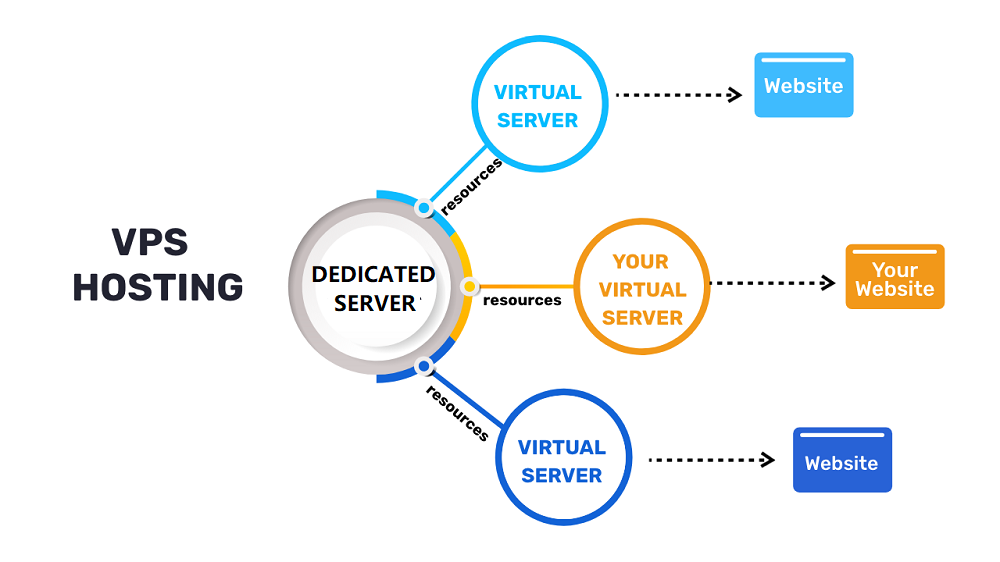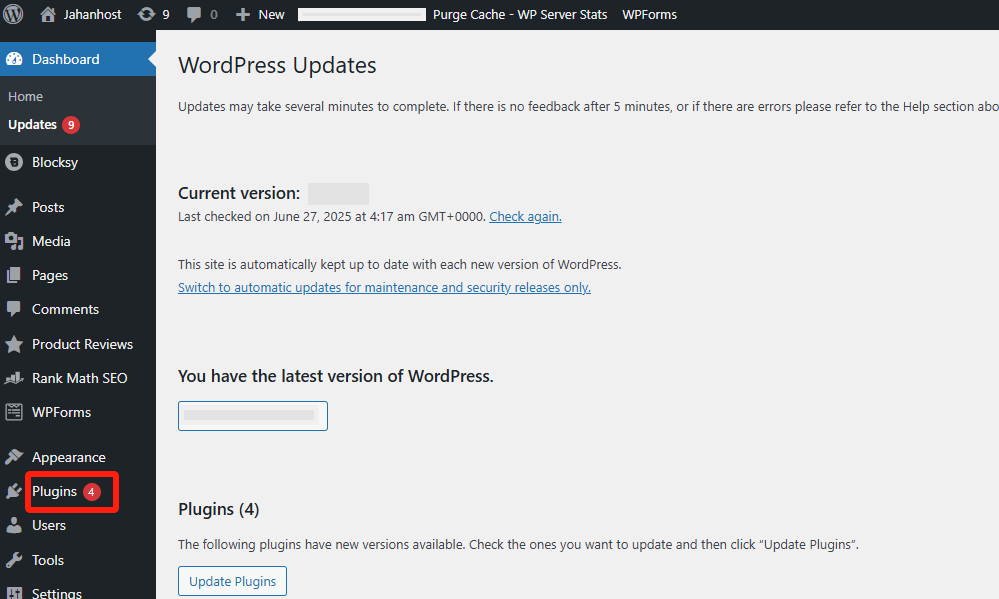In the fast-paced world of online business, competition is everywhere. Every click, every second, and every user interaction counts. For WordPress bloggers, success depends on more than just great content—it also hinges on site speed, security, and scalability. Without a strong foundation, even the most creative blog can struggle to gain traction.
So how do you give your WordPress blog the edge it needs? One powerful solution is VPS hosting. More and more bloggers and online entrepreneurs are discovering that Virtual Private Server (VPS) hosting offers a strategic way to grow, perform, and protect their websites without breaking the bank.

Why Hosting Quality Can Make or Break Your Blog
Hosting is often the unsung hero of website performance. It determines how quickly your pages load, how safe your data is, and whether your site can handle traffic spikes. At its core, web hosting is the process of renting space on a server where your site’s content—files, databases, and media—is stored and distributed to users worldwide.
A reliable web host enhances your site’s user experience, improves your SEO rankings, and helps shield you from cyber threats. Whether you’re running a small personal blog or an emerging eCommerce venture, the right hosting solution lays the groundwork for long-term success.
Shared, Cloud, or VPS Hosting: What’s the Difference?
There are several hosting options available:
- Shared hosting is cost-effective and beginner-friendly but comes with limitations. You share resources with dozens (or even hundreds) of other websites, which can slow your site down during peak traffic hours.
- Cloud hosting offers flexibility and is great for high-traffic sites, but can be more complex and expensive.
- VPS hosting, however, stands out by offering dedicated resources, better security, and increased control—without the high cost of a physical dedicated server.
What Is VPS Hosting?
VPS (Virtual Private Server) hosting is a hybrid solution. It mimics the environment of a dedicated server within a shared hosting framework. Through virtualization technology, one physical server is divided into multiple virtual compartments, each acting as a private server.
Each VPS has its own CPU allocation, RAM, disk space, and operating system. This gives users full root access and greater flexibility in configuration, making VPS a favorite for developers, growing businesses, and advanced bloggers.

What makes VPS particularly appealing is that you get all of this power and control at a fraction of the cost of a dedicated server.
Why VPS Hosting Is Ideal for WordPress Bloggers
1. Dedicated Resources for Peak Performance
As your blog grows, so does the need for stable performance. Shared hosting often struggles under heavy loads, resulting in slower page load times and increased bounce rates. VPS hosting gives your site its own share of resources, ensuring fast, consistent performance even during traffic spikes.
2. Improved Site Security
In today’s digital world, security is everything. With VPS, your site is isolated from others, reducing the risk of cross-site contamination. You can install custom firewalls, use secure authentication protocols, and even integrate a VPN for encrypted access. This is especially useful for blogs that handle user data, eCommerce transactions, or sensitive content.
3. Full Control Over Your Environment
Want to install a specific version of PHP? Configure advanced caching? Modify server settings for speed optimization? VPS gives you the power to customize your environment however you like. You’re not limited by the restrictions imposed by shared hosting providers.
4. Scalability for Growth
VPS makes it easy to scale up as your needs evolve. With just a few clicks, you can upgrade your server resources—CPU, memory, storage, and bandwidth—without needing to migrate to a new host. This means your site grows with you, seamlessly.
5. Cost-Effective Power
VPS bridges the gap between shared hosting and dedicated servers. You get much of the performance and flexibility of a dedicated server, but at a lower cost. This makes VPS ideal for small to medium-sized blogs looking to level up without overspending.
How Big Is the VPS Hosting Opportunity?
According to market research, the VPS hosting industry is booming. Reports estimate it could surpass $8 billion by 2026, driven by increased demand for scalable, affordable hosting solutions for startups, bloggers, and small businesses.
Hosting providers like Hostinger, Fasthosts, and others have already rolled out WordPress-optimized VPS plans, offering one-click WordPress installs, automated backups, and enhanced performance—all within a VPS framework.
Real Advantages of VPS Hosting for WordPress Blogs
Let’s explore some of the specific ways VPS hosting benefits WordPress users:
WordPress Theme and Plugin Compatibility
Unlike some shared hosts that limit what plugins you can use, VPS lets you install any WordPress theme or plugin—even high-resource ones like Elementor, WooCommerce, or WPML—without compromising performance.
Better SEO and User Retention
Search engines prioritize fast-loading, secure websites. VPS hosting helps reduce load times and downtime, leading to improved search rankings and a better user experience. That means more page views, more returning visitors, and ultimately more revenue.
Ideal for eCommerce and High-Traffic Blogs
If you’re monetizing your blog through online courses, affiliate marketing, product sales, or digital downloads, VPS gives you the stability and bandwidth you need to support complex transactions and real-time customer activity.
VPS Hosting vs. Shared Hosting: A Quick Comparison
| Feature | Shared Hosting | VPS Hosting |
| Performance | Slows during traffic | Consistent, fast |
| Resource Allocation | Shared with others | Dedicated virtual slice |
| Security | Medium | High |
| Customization | Limited | Full root access |
| Scalability | Very limited | Seamless, scalable |
| Price | Low | Medium (cost-effective) |
How to Optimize Your VPS for WordPress Blog Growth
Moving to VPS is a great first step—but to truly maximize your investment, you need to optimize your environment. Here’s how:
1. Keep WordPress and Server Software Up to Date
Always use the latest versions of WordPress core, plugins, and themes. Outdated components can create security vulnerabilities and slow your site down. Also ensure your server is running the latest PHP and MySQL/MariaDB versions for maximum performance.
2. Use Monitoring Tools
Install tools like WP Server Health Stats or server-level monitors like Iostat and Sematext to keep track of your CPU, memory, disk space, and overall server health. These tools help you identify issues before they affect users.

3. Allocate Resources Wisely
Ensure your RAM and CPU are being used effectively. Assign higher priority to critical services (like database access or caching) and limit background processes that aren’t essential.
4. Implement Advanced Caching
Use caching plugins like WP Rocket or LiteSpeed Cache to serve static versions of your pages, reducing load on the server and speeding up load times for users.
5. Use a Content Delivery Network (CDN)
A CDN offloads static assets like images, JavaScript, and CSS to global servers, making page delivery faster and more efficient. This reduces the strain on your VPS and improves the experience for international visitors.
6. Secure Your Server Environment
Install a firewall, use strong SSH credentials, and disable unused ports. Consider combining VPS with a VPN for secure remote access. VPS isolation, plus VPN encryption, can significantly reduce the risk of unauthorized access.
7. Regular Backups and Recovery
Set up automated backups through your hosting panel or third-party tools like UpdraftPlus or JetBackup. Having a recovery plan in place ensures that you’re protected against unexpected failures or data loss.
Why a VPS-Powered Future Is the Right Choice for Bloggers
Whether you’re launching your first serious blog or scaling an existing platform, VPS hosting offers everything you need to grow confidently:
- Speed that keeps users engaged
- Security that protects your content and visitors
- Flexibility to evolve your site as your vision grows
- Affordability that won’t drain your budget
Final Thoughts: Is It Time to Move to VPS?
If your WordPress blog is outgrowing your shared hosting plan, or you’re tired of slow load times and limited control, VPS hosting could be your next smart move.
It gives you the resources and freedom to run your blog the way you want—faster, safer, and more professionally.
So ask yourself: Are you building a site to survive, or a site to scale?
Make the switch to VPS hosting today and unlock the true potential of your WordPress blog.With VPS hosting, you’re not just upgrading your server—you’re future-proofing your digital presence.
